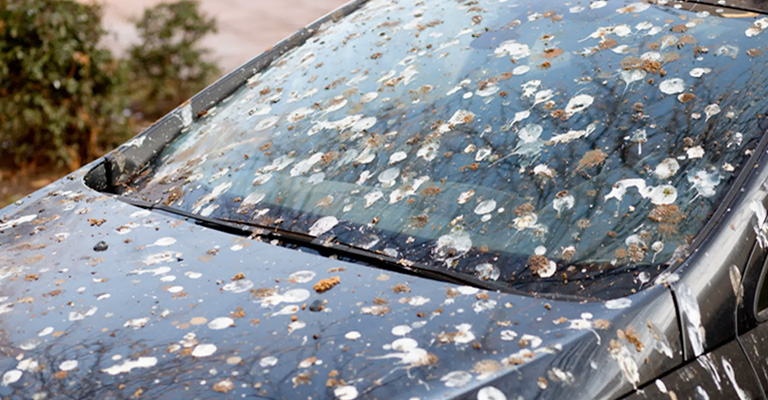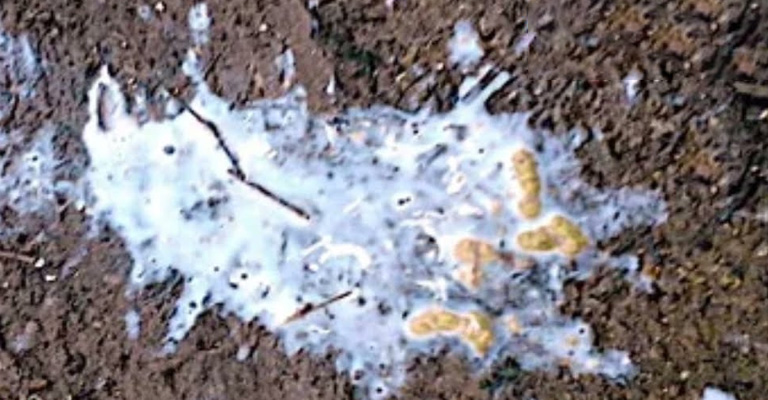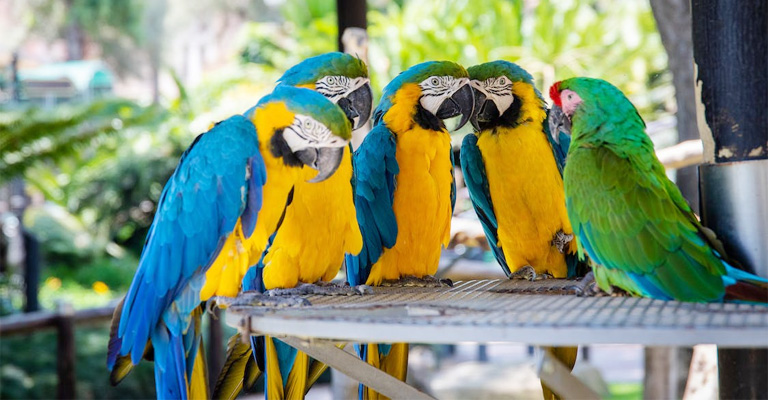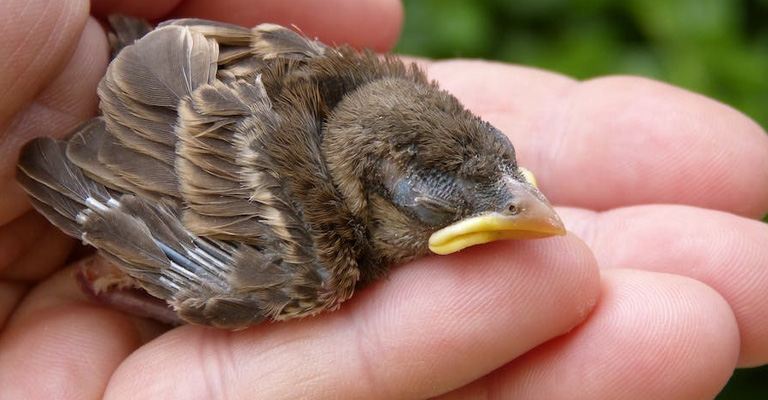As a bird owner, you’re bound to become concerned when you notice changes in your bird’s droppings. It can be particularly worrying when your bird’s poop appears watery. If you’re wondering ‘Why is my bird’s poop watery’, here’s your answer.
Birds poop watery due to a sudden diet change. It can also be a sign of illness and stress. Poisoning, parasites, liver issues, etc., can also be the culprit.
Let’s get into the details and find out how to diagnose and treat the bird pooping watery issue.

Common Symptoms of Birds Pooping Watery
Birds pooping watery droppings can indicate a range of underlying health issues. Here are some common symptoms associated with birds pooping watery, along with detailed explanations:
Diarrhea
Birds with watery droppings may have diarrhea, characterized by loose or liquid feces. Various factors, including dietary changes, bacterial or viral infections, parasitic infestations, stress, or certain medications, can cause diarrhea. Diarrhea can lead to dehydration and electrolyte imbalances if not addressed promptly.
Increased Frequency of Defecation
Birds with watery droppings may exhibit an increased frequency of defecation. Instead of regular intervals between droppings, affected birds may pass watery droppings more frequently. This can indicate an underlying gastrointestinal issue, such as an infection or inflammation.
Changes in Dropping Color and Consistency
Watery droppings can change color and consistency. The fecal portion may appear more liquid or runny than usual, while the urates (the white part of the dropping) may be diluted or less distinct.
The color of the feces may also change, becoming lighter or taking on a different hue, depending on the underlying cause of the watery droppings.
Foul Odor
Watery droppings in birds may have a more pungent or foul odor compared to normal droppings. This can indicate an infection or an abnormal digestive process within the bird’s gastrointestinal tract.
Lethargy and Decreased Appetite
Birds with watery droppings may exhibit lethargy, decreased activity levels, and a reduced appetite.
These symptoms can be attributed to the discomfort and underlying health issues affecting the bird’s digestive system. Decreased food intake can further exacerbate the risk of dehydration and nutrient deficiencies.
Weight Loss
The continued passage of watery droppings can lead to weight loss in birds. The inability to properly absorb nutrients from the digestive tract and increased fluid loss can result in a decline in body weight and overall weakness.
Dehydration
Watery droppings can lead to dehydration in birds if the excessive fluid loss is not compensated by increased water intake. Dehydration can further impact the bird’s health, causing additional complications and making it essential to address the underlying cause promptly.
Behavioral Changes
Birds experiencing watery droppings may exhibit changes in behavior, including increased restlessness, discomfort, or signs of distress. They may also show decreased interest in grooming or interacting with their environment.
If you observe your bird consistently pooping watery droppings or notice any accompanying symptoms mentioned above, it is essential to seek veterinary attention.
A veterinarian experienced in avian care can conduct a thorough examination, perform diagnostic tests, and provide appropriate treatment to address the underlying cause of the watery droppings and improve your bird’s health.
Why Do My Birds Poop Watery? – Causes

Various factors, including health issues, dietary factors, environmental conditions, or stress, can cause watery bird droppings. Here are some common causes of why birds may have watery droppings, explained in points:
Infections
Birds may develop bacterial, viral, or fungal infections that affect their digestive system, leading to watery droppings. Birds’ common infections include avian gastric yeast (AGY), bacterial enteritis, or viral infections like avian influenza. These infections can disrupt the normal digestion and absorption processes, resulting in watery droppings.
Poor Diet
An imbalanced or inappropriate diet can lead to digestive problems in birds, resulting in watery droppings. Feeding birds a diet lacking essential nutrients or high water content can impact their digestive health. Inadequate fiber intake, sudden dietary changes, or feeding spoiled food can also contribute to watery droppings.
Parasitic Infestations
Parasites, such as coccidia, Giardia, or worms, can infect a bird’s gastrointestinal tract and cause diarrhea, leading to watery droppings. These parasites interfere with the absorption of nutrients and water, resulting in loose stools.
Environmental Factors
Environmental conditions, such as extreme heat or humidity, can contribute to watery droppings in birds. Heat stress can impact their digestion and cause changes in droppings. Poor ventilation, damp living conditions, or exposure to environmental toxins can also affect a bird’s gastrointestinal health.
Stress
Stressful situations can disrupt a bird’s digestive system and result in watery droppings. Changes in their environment, the introduction of new birds, improper handling, or lack of social interaction can all contribute to stress in birds. This stress can manifest as digestive disturbances and affect the consistency of their droppings.
Medications:
Certain medications, such as antibiotics or antiparasitic drugs, can impact a bird’s digestive system and lead to watery droppings as a side effect. These medications can disrupt the average balance of gut bacteria or affect the absorption of nutrients, resulting in loose stools.
Toxicity
Ingestion of toxic substances can cause gastrointestinal disturbances and watery bird droppings. This can include exposure to household cleaners, pesticides, certain plants, or contaminated food and water sources.
Digestive Disorders
Birds may develop digestive disorders such as gastritis, enteritis, or malabsorption, which can contribute to watery droppings. These conditions can be caused by various factors, including bacterial overgrowth, inflammation, or underlying health conditions.
It’s essential to consult with an avian veterinarian if your bird is consistently experiencing watery droppings.
A thorough examination, diagnostic tests, and proper treatment can help identify and address the underlying cause, improving your bird’s digestive health and overall well-being.
How to Diagnose Bird Pooping Watery?

Diagnosing the cause of a bird pooping watery droppings requires a comprehensive approach that involves observing the bird’s behavior, conducting physical examinations, and performing diagnostic tests.
Here are the steps involved in diagnosing the underlying cause of a bird pooping watery, explained in points:
Veterinary Consultation
Seek the expertise of an avian veterinarian specializing in bird health. They have the knowledge and experience to diagnose and treat avian conditions effectively.
Detailed History
Provide the veterinarian with a detailed history of the bird’s behavior, diet, environment, and any recent changes that may be relevant. This information will help the veterinarian narrow down the potential causes.
Physical Examination
The veterinarian will perform a thorough physical examination of the bird, assessing its overall health, body condition, and any visible abnormalities.
They will also listen to the bird’s breathing and examine the plumage, eyes, beak, feet, and feathers for signs of illness or injury.
Fecal Examination:
A fecal examination is crucial in diagnosing the cause of watery droppings. The veterinarian will collect a fresh stool sample and analyze it under a microscope to identify the presence of parasites, such as coccidia, worms, or protozoa. They may also check for the presence of abnormal bacteria or fungi.
Blood Tests
Blood tests, such as a complete blood count (CBC) and blood chemistry panel, may be conducted to evaluate the bird’s overall health, check organ function, and identify any signs of infection or inflammation.
Bacterial Culture and Sensitivity
If the veterinarian suspects a bacterial infection, they may collect a sample from the bird’s droppings or cloaca and send it to a laboratory for bacterial culture and sensitivity testing.
This test helps identify the bacteria causing the infection and determine the most effective antibiotic treatment.
Viral Testing
In cases where viral infections are suspected, specific tests may be conducted to identify the presence of viruses, such as avian influenza or avian herpesvirus.
Radiographs or Ultrasound
If the veterinarian suspects an internal issue, such as gastrointestinal blockage or organ abnormalities, they may recommend radiographs (X-rays) or ultrasound imaging to visualize the bird’s internal organs.
Endoscopy or Biopsy
In some cases, the veterinarian may need to perform an endoscopy or take a tissue sample (biopsy) further to evaluate the bird’s digestive tract or organs. This procedure allows for a more detailed examination and may be necessary for a definitive diagnosis in some instances.
Elimination Diet:
If the watery droppings are suspected to be caused by dietary factors or allergies, the veterinarian may recommend an elimination diet to identify specific food triggers or sensitivities.
Following these steps, the veterinarian can diagnose the underlying cause of a bird pooping watery droppings and develop an appropriate treatment plan to address the specific condition.
It’s crucial to consult with a qualified avian veterinarian for an accurate diagnosis and proper management of your bird’s health.
How to Treat If My Bird Is Pooping Watery?

The treatment for a bird pooping watery droppings depends on the underlying cause identified by a veterinarian. It is essential to consult with an avian veterinarian for an accurate diagnosis and appropriate treatment plan.
Here are some general treatment approaches that may be employed, explained in points:
Veterinary Consultation
Seek the expertise of an avian veterinarian who can diagnose the underlying cause and recommend the appropriate treatment. Only attempt to self-diagnose or treat the bird with professional guidance.
Medications
Depending on the cause, the veterinarian may prescribe medications such as antibiotics, antiparasitic drugs, or antifungal agents to address bacterial, parasitic, or fungal infections respectively. It is essential to follow the prescribed dosage and duration of medication as instructed.
Dietary Modifications:
If the cause of watery droppings is related to the bird’s diet, the veterinarian may recommend dietary modifications. This may include changing the bird’s food to a balanced, species-appropriate diet that meets their nutritional needs. Avoid feeding foods that may contribute to digestive upset, such as excessively watery or spoiled food.
Fluid Therapy:
In cases where the bird is dehydrated due to persistent watery droppings, the veterinarian may administer fluids orally or intravenously to rehydrate the bird and restore electrolyte balance. It is crucial to address dehydration promptly to prevent further complications.
Environmental Management:
If environmental factors contribute to watery droppings, it is essential to make necessary adjustments. Ensure proper ventilation, maintain a clean living environment, and provide appropriate temperature and humidity levels. Minimize exposure to toxins or irritants affecting the bird’s respiratory or digestive system.
Supportive Care:
Support the bird to aid in its recovery. This may include maintaining a quiet, stress-free environment, proper perching surfaces, and ensuring access to fresh water and a balanced diet. Monitor the bird’s appetite, weight, and overall behavior to track its progress.
Follow-up Care:
Follow the veterinarian’s instructions for follow-up appointments, tests, or treatments. Monitoring the bird’s droppings closely and communicating any changes or concerns to the veterinarian is essential. Regular check-ups can ensure that the treatment plan is effective and make any necessary adjustments if needed.
Remember, each bird’s condition is unique, and the treatment plan may vary based on the underlying cause and the bird’s overall health. It is crucial to consult with an avian veterinarian who can provide personalized guidance and treatment specific to your bird’s needs.
FAQs
Watery droppings can indicate an underlying health issue. It is best to consult a veterinarian to determine the cause and appropriate treatment.
Maintain a balanced and species-appropriate diet, provide a stress-free environment, and ensure regular veterinary check-ups to prevent potential health issues.
Yes, some variations in droppings are normal depending on factors like diet and hydration. However, persistent watery droppings should be investigated.
It is advisable to consult a veterinarian for proper diagnosis and treatment. Home remedies may not address the underlying cause effectively.
If the droppings return to normal and the bird appears healthy, it is a positive sign. However, if the problem persists or recurs, veterinary attention is necessary.
Final Thoughts
That was all about why my birds poop watery. Watery droppings in birds can be indicative of an underlying health issue that requires prompt attention.
By recognizing the common symptoms, understanding the potential causes, seeking a proper diagnosis, and following the appropriate treatment, bird owners can ensure the well-being of their feathered companions.
Regular veterinary care and a healthy lifestyle can help prevent digestive disturbances and promote overall bird health. Remember, consulting a veterinarian is crucial for an accurate diagnosis and tailored treatment plan for your bird’s specific needs.